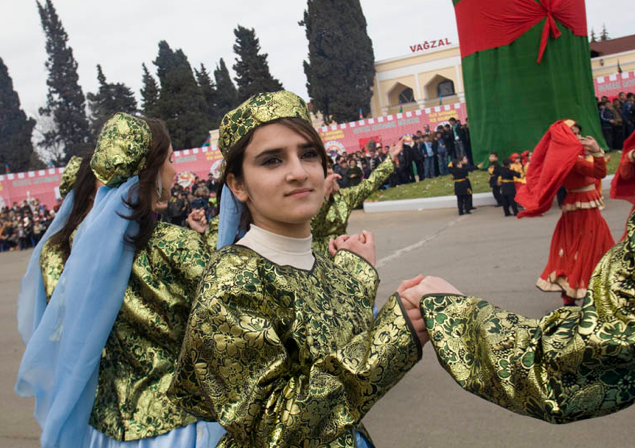
Moscow Signals It Can Still Play Talysh Card Against Baku
Publication: Eurasia Daily Monitor Volume: 20 Issue: 137
By:

One of the most important trends in the post-Soviet space has been the sharp reduction in the relative size of non-titular nations in the newly independent countries. Yet, while Moscow’s opportunities to exploit these national minorities have declined as a result, the Russian authorities still make use of them. They present Moscow as the chief defender of ethnic Russians and Russian speakers in these states, employing other ethnic minorities as leverage against the governments involved. In recent years, Moscow’s efforts in this regard have centered most prominently on the Karakalpaks of Uzbekistan and the Gagauz of Moldova (see EDM, June 9, 2020, May 9).
The Kremlin has also shown that it has not forgotten those groups it earlier exploited and reserves the right to turn its attention back to them when it feels necessary. Perhaps the most prominent example of this is the Talysh, a Persian-speaking group in Azerbaijan numbering several hundred thousand there and about the same number in adjoining sections of Iran. Three decades ago, some in Moscow supported this group; however, this minority appears to have been largely ignored in the Kremlin since that time. Even so, over the past several weeks, the Talysh have returned to the center of new tensions in Russia’s relationship with Azerbaijan.
The ostensible cause of this conflict was a memorial held on August 9 in the Urals city of Yekterinburg commemorating the 30th anniversary of the formation of the Talysh-Mughan Autonomous Republic. This republic was a short-lived state formation within Azerbaijan that unsuccessfully pursued the creation of an autonomous region for the Talysh living there. That effort attracted relatively little popular support at the time and was suppressed within weeks by Baku. The ringleaders were arrested, sentenced to long prison sentences and, in some cases, ultimately expelled to the Netherlands where they later formed a Talysh independence party. But with rare exceptions over the past 30 years, the group has attracted little attention beyond Azerbaijan (see EDM, February 3, 2015; Kavkaz-uzel.eu; Nakanune.ru, August 28; Forum-msk.org, September 1).
That public neglect might have continued even with the Yekaterinburg meeting save for two key factors. First, tensions between Moscow and Baku are mounting over the future of Karabakh and other issues, which is prompting the Kremlin to employ various means to demonstrate its ability to cause trouble in the South Caucasus for anyone who challenges its authority (News.am, August 28). Second, the attendance of Igor Volodin, chair of the Yekaterinburg city council and a member of the United Russia party, at the Talysh memorial created quite a stir, as it seemed to signal that the event had Moscow’s approval.
These tensions and the appearance of a prominent albeit local Russian official prompted Baku to send a diplomat note to Moscow on August 16 protesting what the Azerbaijani government sees as official Russian support for the Talysh and thus opposition to Baku’s efforts to integrate its national minorities. The note was followed by a statement from Azerbaijan’s ambassador in Moscow denouncing Volodin’s appearance and articles in the Azerbaijani media criticizing Russian interference in Azerbaijan’s internal affairs (Ura.news, August 16; News.ru, August 27; Kavkaz-uzel.eu;Nakanune.ru, August 28).
Volodin may have appeared at the meeting entirely on his own initiative to gain support from members of the Talysh minority now living in his city who are voters there. This may very well have been the case, Moscow officials, on August 27, told the Azerbaijani embassy that Volodin would not remain chair of the city duma after the upcoming elections. They assert that he should have consulted with more senior officials before appearing at such a meeting. And the fact that he did not raises questions about his reliability and current position (Ura.news, August 31). These officials undoubtedly hope that they have “extinguished” the controversy, especially given that many more could lose their jobs if the Kremlin decides they, too, have violated official policy (News.ru; 66.ru, August 30).
However, there are compelling reasons to think that this is hardly the whole story. On the one hand, senior Russian politicians do not attend meetings of foreign opposition groups without either explicit direction from their higher-ups or because they believe that what they are doing is consistent with official policy. On the other hand, growing tensions between Moscow and Baku over the Armenian community in Karabakh and its future within Azerbaijan make the Volodin fiasco seem reminiscent of the Kremlin “playing the Talysh card.” After all, by reminding the Azerbaijani authorities that Moscow can cause trouble for Baku if it does not go along with Russia on negotiations with Yerevan, the Kremlin is clearly hopeful that the Azerbaijani government will decide that it is better not to challenge Russia directly lest it face something like a new Mughan movement.
And the potential for such a movement may be even greater now as Russia and Iran may now be on the same side of the issue. Tehran seems to want to rein in Baku and dispatch Talysh groups from within Iran to the southern part of Azerbaijan to cause trouble. Such a move would give the Azerbaijani government another ethnic issue to handle—something it does not need given the international attention to the closure of the Lachin corridor by which the ethnic Armenians in Karabakh had been receiving supplies from Yerevan.
Hence, a Talysh meeting in a Russian city far from the South Caucasus may be about more than it appears on the surface and have consequences far greater than many are inclined to think. At the very least, these possibilities will be on the mind of policymakers in Moscow and Tehran, on the one hand, and Baku and its allies, on the other. And that will remain true even if the diplomatic back-and-forth over the Yekaterinburg meeting quiets over the next several weeks.



